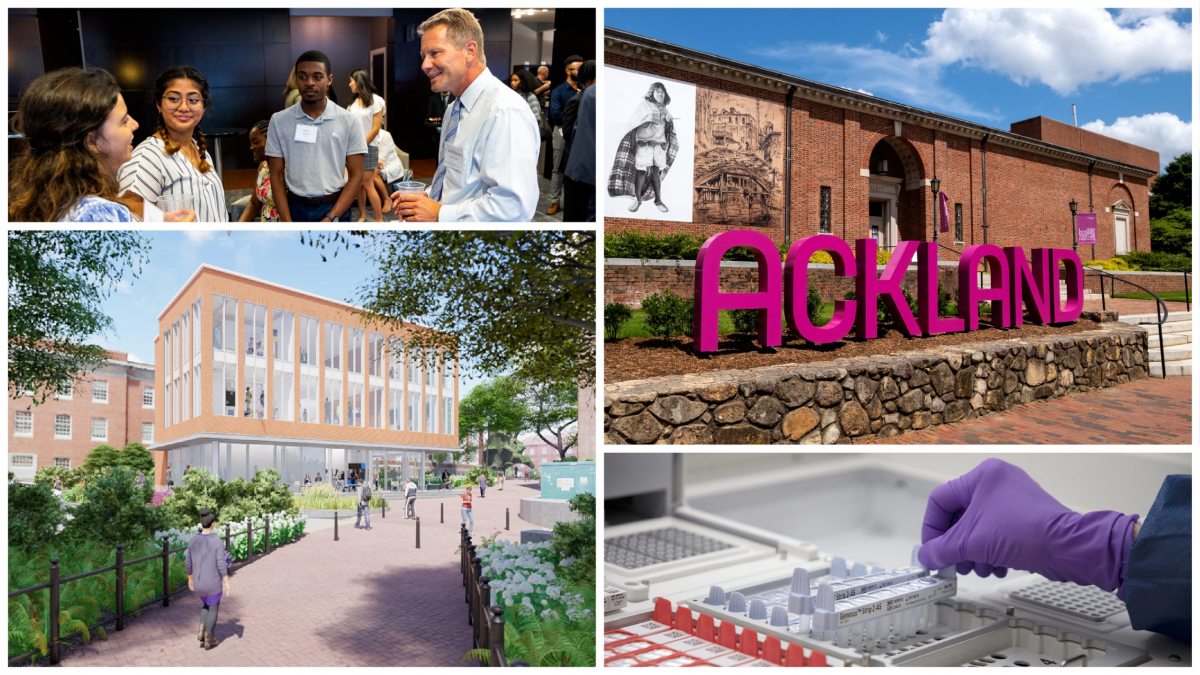Campus feels tangible effects of campaign funding
New scholarships and programs, health care advances and better buildings are just some of the ways the Campaign for Carolina is making an immediate impact.

Last month, Carolina proved how good it was at raising money, as the Campaign for Carolina announced that it had met its $4.25 billion milestone a year early.
The University is also good at putting that money to work — in programs, buildings, scholarships and other efforts on campus and beyond.
“The impact of this campaign will echo for generations to come,” Chancellor Kevin M. Guskiewicz said. “We already see many tangible effects on our campus such as new scholarships and fellowships, groundbreaking programs for our students, advancements for our patients and state-of-the-art buildings and facilities that have been established since this campaign began.”
While the true impact of the Campaign for Carolina will be measured over decades, as some donations pay out over time and others are deferred, many campaign commitments are already at work supporting Carolina’s key strategic priorities.
Making Carolina affordable and accessible
Launched with a $5 million gift from former UNC System President Erskine Bowles, the Blue Sky Scholars Program has already enabled in-state middle-class students who don’t qualify for financial aid to attend Carolina. Some Blue Sky Scholars have already graduated.
Dependents of military families have attended Carolina thanks to the Red, White and Carolina Blue Challenge, launched with a $20 million gift from Carolina alumni Steve and Debbie Vetter, children of veterans themselves.
The Chancellor’s Science Scholars encourage talented students to explore their interests in science, technology, engineering and math, ultimately strengthening the STEM workforce through diversity. The William R. Kenan Jr. Charitable Trust will match gifts to the program by 50% up to $5 million through December 2023.
Donations to the flexible Carolina Fund were put to work right away during the pandemic to support Carolina Away, the University’s entirely virtual curriculum that enabled students to take digital courses and participate in small-group experiences with classmates, faculty and staff.
Creating modern spaces and places
The Curtis Media Center, a 13,000-square-foot facility adjacent to Carroll Hall, is almost finished. Made possible by a $10 million gift from the Curtis Foundation and Carolina alumnus Don Curtis, chairman and CEO of the Curtis Media Group, the center will house classrooms, production studios and technical space for the Hussman School of Journalism and Media.
The first floor of the Genome Sciences Building has been remodeled as the Institute for Convergent Science’s Convergent Commons area. This front door to innovation includes a 4,500-square-foot collaboration space, cafe and a variety of open and semi-private workspaces.
Located between the two Student and Academic Services Buildings on South Campus, the new National Pan-Hellenic Council Garden Project honors the history and contributions of historically Black fraternities and sororities while creating an attractive outdoor spot for groups to gather.
Promoting diversity, equity and inclusion
The archival phase of The Story of Us, a collection to preserve the personal stories of LGBTQ+ Tar Heels, is underway. The next phase of this project, a partnership of University Archives at the Wilson Special Collections Library and the Carolina Pride Alum Network, will be performances based on the oral histories collected.
The Ida B. Wells Center has been able to expand its college internship partnerships and launch a yearlong project for aspiring journalists at Riverside High School in Durham, thanks to a $1 million grant from the Black Community Commitment made by basketball legend Michael Jordan and the Jordan Brand.
In July 2020, the College of Arts & Sciences hired three new faculty from the Carolina Postdoctoral Program for Faculty Diversity Fellows, a program that supports the hiring of underrepresented faculty, especially in disciplines with clear disparities, by investing in six annual fellowships.
Improving health and wellness
The Transforming Health and Resilience in Veterans Program at the Matthew Gfeller Center is scheduled to open this year. THRIVE will make treatment for traumatic brain injuries more accessible for military veterans in and around North Carolina, thanks to a $12.5 million gift from the Gary Sinise Foundation Avalon Network.
During the pandemic, Carolina was able to launch the Rapidly Emerging Antiviral Drug Development Initiative, a collaboration among scientists at the schools of medicine, pharmacy and public health. The goal of READDI is to discover and develop drugs for clinical trial testing in anticipation of future viral pandemics.
Interns participated in the Fetal Age and Machine Learning Initiative, conducted by the UNC Global Women’s Health Division, NC State University and the University of Zambia School of Medicine. FAMLI’s goal is to improve the health of women in some of the world’s poorest countries using a computer program to evaluate ultrasound images and determine a diagnosis.
Supporting art and culture
Thanks to a gift from longtime supporter, the Ackland Art Museum has established the S.K. Heninger Jr. Fund for Islamic Art. The gift will expand the range of cultural objects available for visitors as well as Carolina faculty, staff and students and will be used in a new Ackland program to help schools in Guilford and Wake counties and Chapel Hill/Carrboro to revise their social studies curriculum using the Ackland’s expertise in object-based teaching.
The Program for Public Discourse began presenting the Abbey Speaker Series, free public presentations held four times a year. Established in 2020 with a gift from Nancy ’74 and Doug Abbey, the series brings experts from different disciplines and fields to campus to discuss timely issues across a range of perspectives.
The Campaign for Carolina continues through Dec. 31 with a renewed focus on reaching its $1 billion goal for scholarships and individual school and unit priorities.




